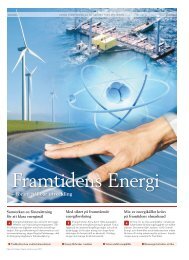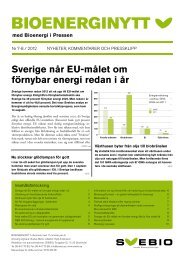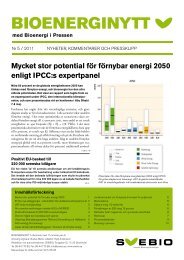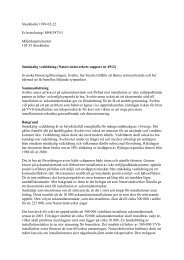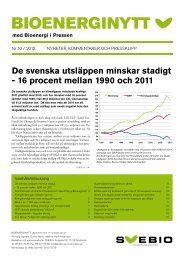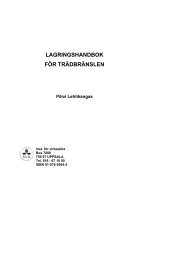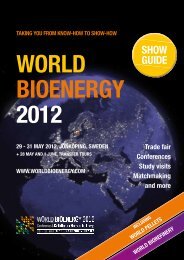Proceedings World Bioenergy 2010
Proceedings World Bioenergy 2010
Proceedings World Bioenergy 2010
Create successful ePaper yourself
Turn your PDF publications into a flip-book with our unique Google optimized e-Paper software.
98 world bioenergy <strong>2010</strong><br />
ORGANISATIONAL FRAMEWORKS FOR STRAW-BASED ENERGY SYSTEMS IN UKRAINE AND<br />
WESTERN EUROPE<br />
Y. Voytenko*, P. Peck<br />
*Department of Environmental Sciences and Policy, Central European University, Nádor u. 9, 1051 Budapest, Hungary,<br />
tel. + 36 1 327 3021; yuliya.voytenko@mespom.eu<br />
International Institute for Industrial Environmental Economics at Lund University, Tegnérsplatsen 4, 22100 Lund, Sweden,<br />
tel. +46 46 222 0200; fax: +46 46 222 0230; philip.peck@iiiee.lu.se<br />
Ukraine (UA) has large biomass potentials, and faces broad needs for energy security enhancement, agricultural sector<br />
revitalisation and environmental improvement. Cross case study analysis is applied to nine straw-fired installations in UA<br />
within a conceptual framework developed by the authors. The analysis yields three distinct straw-based frameworks for<br />
organisation and action including ‘small scale local heat production’, ‘small scale local straw production for fuel sale to<br />
municipality’, and ‘medium scale conversion and district heating’. Ukrainian case is then compared to countries with<br />
more advanced bioenergy sectors, i.e. Sweden (SE) and Denmark (DK). Individual business entrepreneurship qualities<br />
and knowledge are found crucial on small and medium scale. Straw use on large scale requires substantial and consistent<br />
support from the National government. Barriers to the expansion of bioenergy in UA include low access to technology<br />
and funding, lack of knowledge on bioenergy funding schemes, and bioenergy in general. The outcomes of the paper are<br />
transferable to various contexts on the condition that local specificities are taken into account.<br />
Keywords: bioenergy management, developing countries, logistics, non-technical barriers to bioenergy, straw<br />
1 INTRODUCTION<br />
This paper has its point of departure from the<br />
recognition of a number of parameters that have been<br />
found important for the transformation of local<br />
energy systems towards bioenergy. These include<br />
resources available (i.e. physical, human and<br />
organisational capital) [1], financial and technological<br />
resources [2], social capital [3], and strategies for the<br />
transformation of local energy systems [4-‐10]. The<br />
latter component (deliberate strategies) however,<br />
infers a need for “frameworks for organisation and<br />
action” that can support such transformation. Yet<br />
limited work is available in the area.<br />
Earlier research by the authors [11,12]<br />
highlighted four promising framework types for<br />
organisation of straw-‐based energy systems in<br />
selected Western European (WE) countries, i.e.<br />
Sweden (SE), Denmark (DK) and Spain (ES), and key<br />
factors that define and foster energy system<br />
transition. Each country has gone down its own<br />
transition path but when viewed collectively, they<br />
constitute a good ‘learning environment’ for other<br />
regions where straw-‐based systems are anticipated to<br />
emerge. That work [12] yielded four distinct types of<br />
agro-‐biomass based frameworks (ABFs) for<br />
organisation and action including ‘small scale local<br />
heat production’, ‘medium scale local heat provision<br />
with excess for sale’, ‘medium scale conversion and<br />
district heating (DH)’, and ‘large scale power or<br />
combined heat and power generation (CHP)’.<br />
This work focuses on Ukraine (UA), which has<br />
significant potential for all bioenergy options and crop<br />
residues in particular [13-‐17]. <strong>Bioenergy</strong><br />
development is driven by an urgent need for energy<br />
security enhancement, reduction of dependence on<br />
fuel imports, rural diversification, job creation,<br />
bioenergy business opportunities and potential for<br />
environmental improvement [14,18]. A tangible<br />
policy support environment for bioenergy and real<br />
straw-‐based heating systems are both emerging in UA<br />
[18,19].<br />
This work aims to compile and analyse ABFs that<br />
seek to transform energy systems to bioenergy. The<br />
objectives of the paper are the following:<br />
• to collect and describe existing practices of<br />
straw use for energy in UA;<br />
• to generate empirical conceptual ABFs that<br />
ensure commercial use of straw for energy;<br />
• to compare and contrast ABF types in UA<br />
and WE.<br />
The paper has the following structure. Section 2<br />
provides a background on bioenergy production,<br />
potentials, technology, and markets for crop residues for<br />
energy in UA as well as on support mechanisms for<br />
bioenergy development in the country. Section 3 outlines<br />
a methodological approach to the work. Results on ABFs<br />
for organisation and action in UA are presented and<br />
analysed in Section 4. Section 5 discusses straw-toenergy<br />
experiences in UA and compares them to those in<br />
WE. Section 5 concludes the paper and presents areas<br />
and implications for future research.<br />
2 BIOENERGY IN UKRAINE<br />
2.1 <strong>Bioenergy</strong> production<br />
Current energy production from biomass in UA is<br />
about 38 PJ (0.9 Mtoe) per year, which comes only in the



